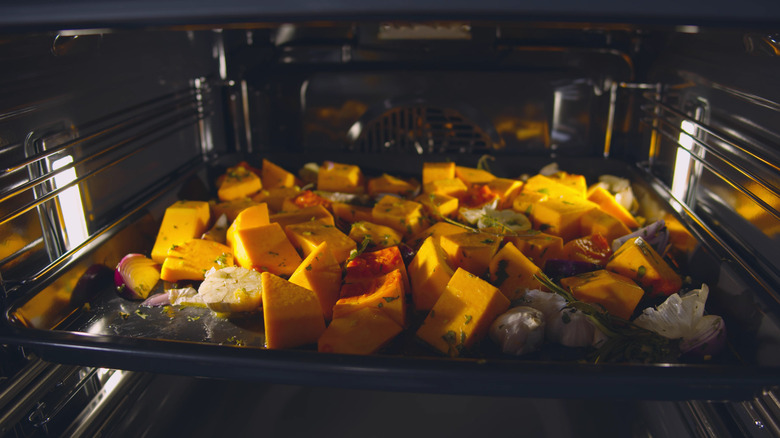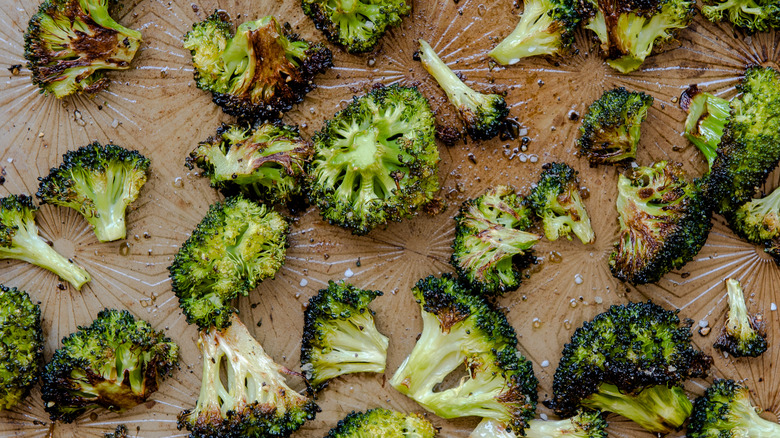The Trick To Getting Perfectly Roasted Frozen Vegetables
Most of us have, at some point, been duped by a fad diet's unsustainable restrictions and unfulfilled promises. We may overlook the unpleasant side effects of popular diets hoping to achieve an unrealistic result, or we may seek out diets that conform to our cravings, like a bacon-lover choosing the keto diet. However, almost every diet can agree on one aspect of healthy eating: we should be eating more vegetables. And you really can't beat the convenience and affordability of frozen vegetables.
Nowadays, it's a myth that frozen food is always salty, particularly flash-frozen vegetables. Unless labeled "sauced" or "seasoned," they usually contain no added ingredients, including salt. And avoiding added salt is one of the many reasons to choose frozen vegetables over canned. Another is nutrient retention; since frozen vegetables reach the deep freeze soon after harvesting and aren't subjected to high pressure or heat, those vitamins and antioxidants are well-retained compared to their canned counterpart.
Now, that's not to say frozen vegetables are the easiest to convert from cold to cooked. There are many mistakes to avoid when cooking frozen veggies; getting a perfectly roasted vegetable from frozen is especially challenging. Fortunately, a handful of easy steps — namely, pan prep and oven temperature — will earn you a plateful of deliciousness.
Perfect veggies start with a well-prepped pan
The most crucial step in roasting frozen vegetables is preheating a generously oiled pan at a high temperature. Your goal here is to quickly evaporate water from the vegetables to achieve caramelization instead of steaming. That objective requires some serious heat; most recipes recommend 450 F. At a more moderate temperature, like 350 F, the water crystals on the frozen fare will steam instead of evaporating, creating a mushier texture. Preheating the pan beforehand with plenty of oil will also jumpstart this flash-cooking process as soon as the veggies hit the pan.
Another step in the caramelize-not-steam method involves spacing individual pieces apart on the pan, preferably to avoid touching at all. Two touching broccoli florets can create a mini-sauna between them, whereas spacing things out — about a quarter inch or more — will let the steam evaporate more efficiently.
And finally, aim for uniform size among your frozen veggie pieces. You may need to slice larger Brussels sprouts in half to ensure they cook equivalently to the smaller sprouts. To save time and texture, don't thaw individually frozen vegetables before you roast. Just take them straight from the freezer, coat with oil and seasoning, and pop them right into the oven on that preheated pan.
The best frozen vegetables to roast
While there are many dishes to make with frozen vegetables, which veggies lend themselves best to roasting? There's really no wrong answer here, especially if you're following the abovementioned techniques. Cruciferous vegetables (such as broccoli or cabbage) are always safe bets. We love some crispy Brussels sprouts and the increasingly popular roasted cauliflower, and both recipes can work equally well with fresh or frozen produce. Root vegetables represent another roasting-friendly category, and their lower water content lends them to more effective caramelization instead of that intrinsic steaming we want to avoid. Some good picks include carrots, parsnips, sweet potatoes, and turnips.
A few veggies are a little riskier to roast. Leafy greens like kale or collards can char very quickly on the edges since their relatively large surface area to volume ratio accelerates water loss. You'll want to keep a closer eye on these to ensure they don't burn. By the way, frozen blocks of spinach are out of roasting contention unless you go through the trouble of thawing, draining, and drying them first.
If choosing frozen food gets more produce on your plate, then great! Remember that the healthiest vegetable is the one you'll actually eat, so adapt any classic roasted vegetable recipe for the veggie you like best. Like grilling vegetables to perfection enhances their flavor, roasting can add a delicious caramelized crown to your healthy fare.


